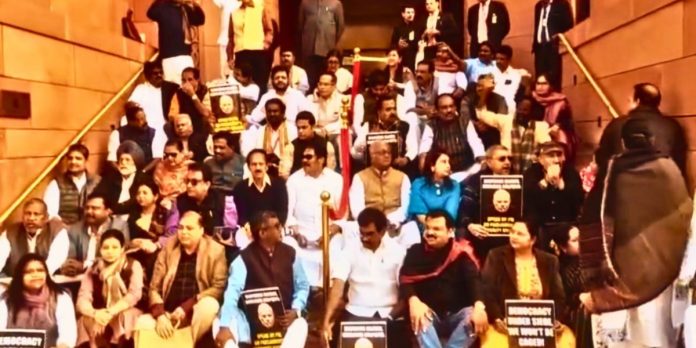—— 141 MPs have been suspended over the past week
—— Most parties have been robbed of a presence in Parliament
—— Over 14 crore voters without a voice in Lok Sabha
DM Monitoring
New Delhi: In the ongoing parliament session, 143 MPs have been suspended over the past week for demanding a discussion on the breach of security at parliament on December 13. The unprecedented numbers have left lakhs of electors across the country without a voice, while some parties have been shorn of their presence in parliament.
When MPs are suspended for demanding accountability, a little more of democracy is sucked out from an ‘electoral autocracy’ that is increasingly paying attention to throttling independent institutions, whose health is what democracies rest on.
The Wire calculates the cost of the suspensions.
Electors denied their voice
Because India does not have a system of proportional representation, the MPs reflect the voices and concerns of their electors. After the suspensions, 14,76,98,507 electors from 94 constituencies no longer have a voice in the Lok Sabha.
The situation was dire in the Rajya Sabha too.
For the Rajya Sabha, to estimate the number of electors muted via these suspensions, The Wire divided the total number of electors in a state by the number of Rajya Sabha MPs that state has, as a broad average of electors each Rajya Sabha member represents. By adding these numbers, depending upon the number of suspensions from the state, we again can get an approximation of the number of voices put away by suspending their MPs.
The number that we arrive at through this calculation is 18,43,83,909 (18.43 crore) electors who have been denied a voice in the upper house through the suspension.
Parties severely depleted, some go missing
The suspension of the MPs for the rest of the session has severely affected the presence of major opposition parties in the two houses of parliament.
In the Lok Sabha, the Congress’s strength has been reduced to a quarter. Other parties like the DMK, TMC and JDU have seen their strength deplete by over 60%. The AAP has no representative in the Lok Sabha anymore, while some smaller parties have also lost their representatives completely.
In the Rajya Sabha too, the strength of major opposition parties was greatly depleted. The Congress was down to a fourth of its strength as was the TMC, while the DMK was cut in half.
Issues raised by MPs were scotched
As many as 71 Questions asked by them are deleted or cancelled, noted Maadhyam, a civil society watchdog.
“In Lok Sabha, a total of 27 Questions are deleted, in Rajya Sabha, 44 Questions are cancelled. Govt manages to escape answering these Qs. It must be remembered that MPs submitted notices of these Qs much before their suspension (notice period for a Q is 15 days).”
A lot of government time is – and rightly so – spent on answering questions raised by MPs. With a data-deficient regime in place, where there is also a good deal of data evasion and manipulation, parliamentary questions and answers are often a key data resource and enable the principle of accountability to seep into the system.
Maadhyam says, “If these were listed for answering today, it means that these Qs successfully made it through a ballot and were admitted for answering. The Ministry would have also prepared the responses by now.”
Importantly, it adds, “MPs don’t ask these Qs for themselves, they ask these Qs for us, on our behalf. The information given in response to these Qs, is public information and not meant for private consumption of the MP. Deleting or cancelling of Qs also deprive people of getting this information.”




